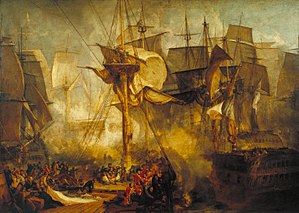|
Falmouth has the third deepest natural harbour in the world, the deepest in Western Europe and is the traditional gateway to the Atlantic – one of the world’s greatest sailing harbours. Some of my fondest memories of Falmouth are from this Church. I use to attend All Saints School from 1975 – 1979 and remember every Friday afternoon, we’d go to the Church to sing. The Church has such an amazing atmosphere about it and it especially liked Christmas time. The history of All Saints Church is pretty fascinating too.
The news of Britain’s victory (and Admiral Nelson’s death) at Trafalgar was landed here, from the schooner “Pickle” and taken to London by stagecoach.
Couresy of WikiPedia http://en.wikipedia.org/wiki/Falmouth,_Cornwall A seeder side to the history of Falmouth, is the story of Lady Killigrew (wife of Sir John Killigrew) – Check out what |
Falmouth Docks – Steam Ships Painting – notice Falmouth Hotel as well. 🙂
Check out this old map of Falmouth and a Google interactive map.
Check out the drive through Falmouth!
Courtesy of youtube
Courtesy of youtube

 Henry VIII built Pendennis Castle (circa 1540) to defend Carrick Roads, and Sir John Killigrew created the town of Falmouth (circa 1613). During the civil war, Pendennis Castle was the second to last fort to surrender to the Parliamentarians. In the late 16th century, under threat from the Spanish Armada, the defences at Pendennis were strengthened by the building of angled ramparts.
Henry VIII built Pendennis Castle (circa 1540) to defend Carrick Roads, and Sir John Killigrew created the town of Falmouth (circa 1613). During the civil war, Pendennis Castle was the second to last fort to surrender to the Parliamentarians. In the late 16th century, under threat from the Spanish Armada, the defences at Pendennis were strengthened by the building of angled ramparts.

 The Falmouth Packet Service operated out of Falmouth, for over 160 years between 1689 and 1851. Its purpose was to carry mail to and from Britain’s growing empire.
The Falmouth Packet Service operated out of Falmouth, for over 160 years between 1689 and 1851. Its purpose was to carry mail to and from Britain’s growing empire.
